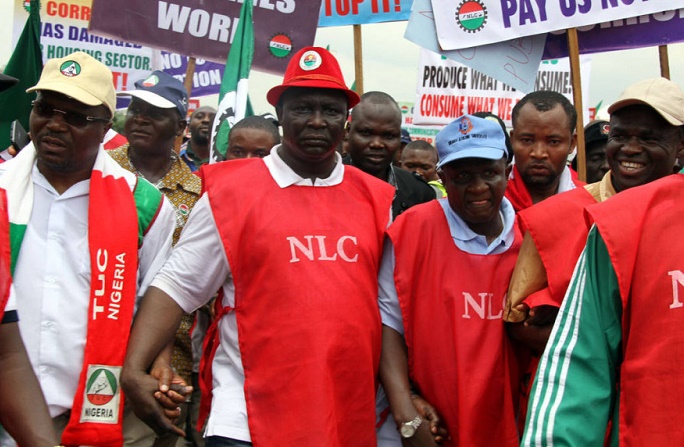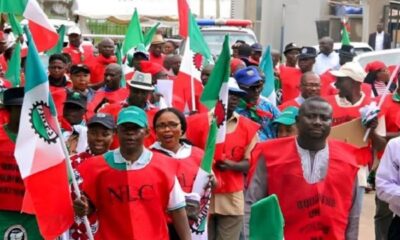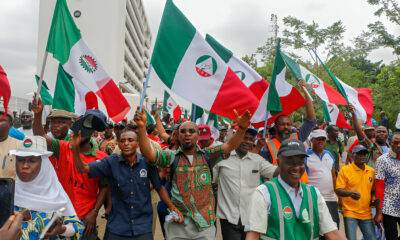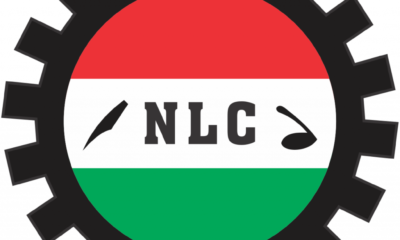The Nation
Hardship, Fuel Price: Nigerians are stretched, may revolt – Organized Labour

Organized Labour has raised alarms over the recent surge in petrol prices, warning that the Federal Government’s repeated hikes are stretching Nigerians’ patience to a breaking point.
Labour cautioned the government to heed the silence of citizens, noting that continued economic strain could spark an “unexpected reaction” from the masses.
A Labour representative at a recent meeting with government officials, who spoke under anonymity, expressed concerns that officials are “gradually pushing the masses to revolt.” The representative noted that hardships caused by high fuel costs are leaving people with diminished income and reduced purchasing power, an impact that is particularly evident in the production and transportation sectors. Employers, such as the Chemical and Non-Metallic Products Employer’s Federation (CANMPEF), echoed these concerns, reporting that the elimination of subsidies has driven up logistics costs and weakened household income.
The Independent Petroleum Marketers Association of Nigeria (IPMAN) revealed that their members often face delays at Dangote Refinery, despite paying N40 billion to the Nigerian National Petroleum Company Limited (NNPCL) for petrol supply. IPMAN suggested that allowing marketers to source fuel directly from the refinery could lower prices for consumers, potentially offering some relief amid rising costs.
Labour leaders warned that the government should not overlook Nigerians’ silent endurance of these hardships, as public discontent over the escalating cost of living might soon reach a tipping point.
He said: “We had thought that the Federal Government will halt the incessant increase in the pump price of petrol after our October 16 meeting, where we made the government representatives, led by the Secretary to the Government of the Federation understand the level of frustration, hunger, misery and general restiveness across the country.
‘’Sincerely, we thought the government would give the people a breathing space and suspend the increases. The government is testing the patience of Nigerians. I can tell you that government is pushing the citizens to a boiling point.
“This latest increase yesterday (Tuesday, October 29) is one increase too many and a bitter pill to swallow. The increases are pushing the citizens to the limit.
“Government should not be surprised if the people of Nigeria decide to react in an unexpected way that will shock those in government. The people are really angry, frustrated, hopeless and are moving to a point where they may vent their anger in an unusual way that may be difficult to curtail.
‘’You cannot continue to flog a child and tell him not to cry. Hunger is everywhere, apart from the people in power or their friends and relations.
“The frustration and suffering in the country were also highlighted a few days ago during the meeting of the 19 Northern governors, alongside traditional rulers, among others. Across the country, people are just waiting for something to ignite the fire.
“Increasingly, the government is providing the fuel that will ignite the fire. What is probably left is someone to light the matches. We (Labour) have been urging the government to jettison the anti-people policies and lessen the pain, suffering, hunger, poverty and frustration to no avail.
“We have been cautious, thinking the government will allow common sense, empathy and the reality of the mass suffering of the citizens to drive its actions and inactions. Unfortunately, the reverse has been the case. It is getting to the time when the bubble will burst. Even a goat can bite when pushed to the wall.
Our choices limited
Similarly, addressing the 8th Quadrennial Delegates’ Conference of the National Association of Nigeria Nurses and Midwives, NANNM, yesterday in Abuja, President of Nigeria Labour Congress, NLC, Joe Ajaero, said: “Today, the nation’s macro-economic indices are all heading down south without any letting.
Electricity tariffs have gone up, making power almost inaccessible to a greater number of our citizens.
“Petrol prices have gone through the roof and are nearly impossible for an average Nigerian to afford.
Transportation has become difficult, leading to levels of food scarcity and hunger never seen in the country before now.
‘’That unfortunately has become our lot and that has become what majority of Nigerians look up to us to ameliorate.
“We need your unity and your strength if we are to creatively engage these forces and make governance work for the greater number of workers and people. As it is today, our choices are very limited. It is either we find a way to collectively overcome the forces that are bent on keeping us down as a people or we completely surrender to them and wallow in hopelessness.
“The forces of neo-liberalism must be challenged and the trade union movement remains the only viable force in Nigeria and in the world that can creatively engage it and mitigate its stranglehold on our nation.
“We must offer strong counterpoise to their prebendal logic and proffer newer arguments to triumph over their quest for profit at the detriment of the social will. It is only by remaining strong and united that we can hope to achieve that.
‘’It is sad but we cannot afford to keep our public refineries shut while still importing refined petroleum products. We demand a review of our salaries instead of its eroded values. We must together demand the re-commissioning of Port Harcourt, Warri and Kaduna refineries in keeping with the agreement we had with the Federal Government on October 15, 2023.”
Employers’ group laments
Speaking in a similar vein, the Chemical and Non-Metallic Products Employer’s Federation, CANMPEF, an employer group, said the petrol price increases occasioned by subsidy removal had led to an increase in transportation/logistics and production costs and a decline in household income and purchasing power.
Addressing members and guests at the 45th Annual General Meeting, AGM, of CANMPEF in Lagos yesterday, the President of the employers’ federation, Mr Devakumar Edwin, lamented: “Following the liberalization of the foreign exchange (FX) market, PMS importers are embattled with looming scarcity and sourcing challenges of FX which continues to increase the selling cost of PMS.
‘’The price adjustments led to an increase in transportation/logistics, production costs, decline in household income and purchasing power.
“There is optimism surrounding the possibility of an energy transition that will reduce the industry’s dependence on expensive diesel and PMS. However, significant investments are required to make renewable energy viable for manufacturing operations.’’
According to him, the spillover of the increases in the petrol price, and floating of the naira has worsened the crises facing the manufacturing sector of the nation’s economy.
“For the manufacturing sector to reach its full potential, government’s intervention is critical. If priority attention is given to manufacturing as a strategic value-adding sector, capable of driving economic transformation, then the country can earn its position among industrialized nations.
“To unlock the potential of Nigeria’s manufacturing sector, the government must commit to the following investments: History has shown that protectionist policies can have a profound impact on local industries.
‘’A notable example is Nigeria’s 2007 cement policy, which restricted imports by companies without local manufacturing investments.
‘’In just 15 years following the policy, cement production in Nigeria grew from 7 million metric tonnes to over 60 million metric tonnes per annum. Expanding such policies to sectors like agriculture, petrochemicals, basic chemicals, electronics, and tools manufacturing could set Nigeria on the path to becoming an industrial giant.
“Declare a state of emergency in the manufacturing sector: The sector requires immediate attention, and this can be achieved through policies that promote growth, investment, and innovation. A clear declaration of urgency by the government would demonstrate its commitment to revitalizing the sector.
“Subsidise consumption through manufacturing: By offering tax reliefs and removing tariffs on key agricultural and manufacturing inputs, the government can reduce operational costs and encourage growth.
‘’These subsidies will also have a profound impact on job creation, especially for Nigeria’s youth, who will be gainfully employed in productive industries. The social and security benefits of such a move are immeasurable and far reaching.
‘’Create a favorable business environment: Ensuring ease of doing business is essential for long-term sustainability in the manufacturing sector. This requires a combination of administrative and legal reforms to eradicate bureaucratic barriers and other inefficiencies that hinder industrial growth.”
Marketers spend days at Dangote Refinery, buying through NNPCL — IPMAN
Meanwhile, the Independent Petroleum Marketers Association of Nigeria, IPMAN, said yesterday the price of petrol could reduce, if its members wwere allowed to buy petrol directly from Dangore Refinery.
IPMAN President, Abubakar Garima, who disclosed this in an interview on Channels Television’s Sunrise Daily programme, also said his members could hardly load petrol from Dangote Refinery in Lagos, despite paying N40 billion to the Nigerian National Petroleum Company Limited, NNPCL.
He expressed surprise that the owner of the refinery, Aliko Dangote, said marketers are boycotting his refinery to buy imported petrol.
The IPMAN boss said his members are not importing petrol, as claimed by Dangote, adding that rather than get Dangote petrol through the NNPCL, the private refinery should register independent petrol marketers directly for smooth loading of the product.
“If he (Dangote) can be able to sell the product to us directly, we can buy it because we have to pay before we pick. Currently, we have N40 billion with the NNPCL but we cannot source the product.
“Just of recent, there are some of my marketers that NNPCL sent to load in Dangote refinery and those marketers stayed there with their trucks for four days, and they cannot load.”
Recall that Dangote had after at a meeting with President Bola Tinubu in Abuja on Tuesday, told reporters that he had over 500 million litres in tanks in his refinery but lamented that marketers are not patronising his facility.
However, Garima said IPMAN, with over 20,000 members in Nigeria, had N 40 billion upfront payment with the NNPCL and still couldn’t load petrol from the refinery.
He said Nigerians will see a reduction in the pump price of petrol if Dangote Refinery allowed independent marketers lift the product directly like NNPCL.
Check your price’
The IPMAN president also urged Dangote to check the price of his commodity if marketers importing petrol are boycotting his product.
“Since he (Dangote) says marketers are not buying his product, he should check his price properly. Is it higher than what they are obtaining outside or is it the same rate?
‘’Then if marketers buy this product through him, how long will it take for it to reach their depots? That one too is a factor,” Garima stated.
The IPMAN president said there was nothing wrong if marketers outside his organisation decided to sell imported products but insisted that Dangote should review its price.
(Vanguard)




























